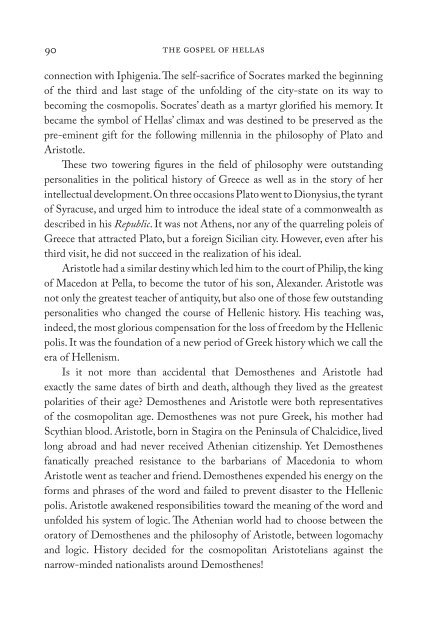The Gospel of Hellas - Research Institute for Waldorf Education
The Gospel of Hellas - Research Institute for Waldorf Education
The Gospel of Hellas - Research Institute for Waldorf Education
You also want an ePaper? Increase the reach of your titles
YUMPU automatically turns print PDFs into web optimized ePapers that Google loves.
0 the gospel <strong>of</strong> hellas<br />
connection with Iphigenia. <strong>The</strong> self-sacrifice <strong>of</strong> Socrates marked the beginning<br />
<strong>of</strong> the third and last stage <strong>of</strong> the unfolding <strong>of</strong> the city-state on its way to<br />
becoming the cosmopolis. Socrates’ death as a martyr glorified his memory. It<br />
became the symbol <strong>of</strong> <strong>Hellas</strong>’ climax and was destined to be preserved as the<br />
pre-eminent gift <strong>for</strong> the following millennia in the philosophy <strong>of</strong> Plato and<br />
Aristotle.<br />
<strong>The</strong>se two towering figures in the field <strong>of</strong> philosophy were outstanding<br />
personalities in the political history <strong>of</strong> Greece as well as in the story <strong>of</strong> her<br />
intellectual development. On three occasions Plato went to Dionysius, the tyrant<br />
<strong>of</strong> Syracuse, and urged him to introduce the ideal state <strong>of</strong> a commonwealth as<br />
described in his Republic. It was not Athens, nor any <strong>of</strong> the quarreling poleis <strong>of</strong><br />
Greece that attracted Plato, but a <strong>for</strong>eign Sicilian city. However, even after his<br />
third visit, he did not succeed in the realization <strong>of</strong> his ideal.<br />
Aristotle had a similar destiny which led him to the court <strong>of</strong> Philip, the king<br />
<strong>of</strong> Macedon at Pella, to become the tutor <strong>of</strong> his son, Alexander. Aristotle was<br />
not only the greatest teacher <strong>of</strong> antiquity, but also one <strong>of</strong> those few outstanding<br />
personalities who changed the course <strong>of</strong> Hellenic history. His teaching was,<br />
indeed, the most glorious compensation <strong>for</strong> the loss <strong>of</strong> freedom by the Hellenic<br />
polis. It was the foundation <strong>of</strong> a new period <strong>of</strong> Greek history which we call the<br />
era <strong>of</strong> Hellenism.<br />
Is it not more than accidental that Demosthenes and Aristotle had<br />
exactly the same dates <strong>of</strong> birth and death, although they lived as the greatest<br />
polarities <strong>of</strong> their age? Demosthenes and Aristotle were both representatives<br />
<strong>of</strong> the cosmopolitan age. Demosthenes was not pure Greek, his mother had<br />
Scythian blood. Aristotle, born in Stagira on the Peninsula <strong>of</strong> Chalcidice, lived<br />
long abroad and had never received Athenian citizenship. Yet Demosthenes<br />
fanatically preached resistance to the barbarians <strong>of</strong> Macedonia to whom<br />
Aristotle went as teacher and friend. Demosthenes expended his energy on the<br />
<strong>for</strong>ms and phrases <strong>of</strong> the word and failed to prevent disaster to the Hellenic<br />
polis. Aristotle awakened responsibilities toward the meaning <strong>of</strong> the word and<br />
unfolded his system <strong>of</strong> logic. <strong>The</strong> Athenian world had to choose between the<br />
oratory <strong>of</strong> Demosthenes and the philosophy <strong>of</strong> Aristotle, between logomachy<br />
and logic. History decided <strong>for</strong> the cosmopolitan Aristotelians against the<br />
narrow-minded nationalists around Demosthenes!

















